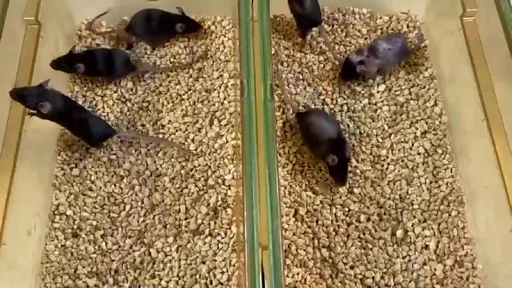Image source, MRC/Duke University Medical Sciences Laboratory
A drug has increased the lifespan of laboratory animals by nearly 25 percent, a discovery that scientists hope could also slow human aging.
In the laboratory, the treated mice were known as “supermodel grandmothers” because of their youthful appearance.
They were healthier, stronger, and developed fewer tumors than their untreated peers.
The drug is already being tested on humans, but it is not known whether it will have the same anti-aging effect.
- Author, James Gallagher
- Role, Health and Science Correspondent
- Chirping,
-
The quest for longer life is intertwined with human history.
However, scientists have long known that the aging process is malleable: laboratory animals live longer if the amount of food they eat is significantly reduced.
The field of aging research is currently booming, as researchers seek to uncover and manipulate the molecular processes of aging.
The team from the MRC Laboratory of Medical Science at Imperial College London and Duke-NUS Medical School in Singapore were studying a protein called interleukin-11.
Its levels in the human body increase with age, it contributes to higher levels of inflammation, and researchers say it flips several biological switches that control the pace of aging.
Longer, Healthier Lives
The researchers performed two experiments.
- The first mice genetically modified so that they were unable to produce interleukin-11
- The second waited until the mice were 75 weeks old (roughly equivalent to a 55-year-old person) and then regularly gave them a drug to flush interleukin-11 from their bodies.
Old laboratory mice often die of cancer; however, mice lacking interleukin-11 had much lower levels of the disease.
They also showed better muscle function, were leaner, had healthier coats, and scored better on several frailty measures.
I asked one of the researchers, Professor Stuart Cook, whether the data was too good to be believed.
He said to me, “I try not to get too emotional, for the reasons you say: is it too good to be true?
“There are a lot of illusions out there, so I try to stick to the data, which is the strongest data out there.”
He said he “definitely” thought it was worth experimenting with on human aging, arguing that the impact “would be transformative” if it worked, and he was willing to try it himself.
But what about people?
The big unanswered questions are: can the same effect be achieved in humans and whether any side effects would be tolerable.
Interleukin-11 plays a role in the human body during the early stages of development.
Very rarely, people are born unable to cope. It changes the way the skull bones fuse together, affects joints, which may require surgery to correct, and the way teeth come in. It also plays a role in scar formation.
Researchers believe that, in old age, interleukin-11 plays the negative role of promoting aging.
The drug, a man-made antibody that targets interleukin-11, is being tested in patients with pulmonary fibrosis. This is where the lungs scar, making it harder to breathe.
Professor Cook said the studies had not been completed, but the data suggested the drug was safe to take.
This is just the latest approach to “treating” aging with drugs. The type 2 diabetes drug metformin and rapamycin, which is taken to prevent rejection of a transplanted organ, are both being actively researched for their anti-aging qualities.
Professor Cook believes it is easier for people to take a drug rather than simply restrict their calories.
“Would you want to live from the age of 40, half-starved, have a completely unpleasant life, if at the end you have to live another five years? I wouldn’t do that,” he said.
Image source, Duke-NUS Faculty of Medicine
Professor Anissa Widjaja, from Duke-NUS Medical School, said: “Although our work was done in mice, we hope these findings will be highly relevant to human health, as we have seen similar effects in studies on human cells and tissues.
“This research represents an important step toward better understanding aging, and we have demonstrated, in mice, a therapy that could potentially prolong healthy aging.”
Ilaria Bellantuono, professor of musculoskeletal ageing at the University of Sheffield, said: “Overall, the data look robust; this is another potential therapy that targets a mechanism of ageing, which may benefit frailty.”
However, he said there were still problems, including a lack of patient trials and the cost of producing such drugs, and that “it is unthinkable to treat all 50-year-olds for the rest of their lives”.
#Ageing #Supermodel #grandma #drug #extends #life #animal #tests #BBC #News
Image Source : www.bbc.com
